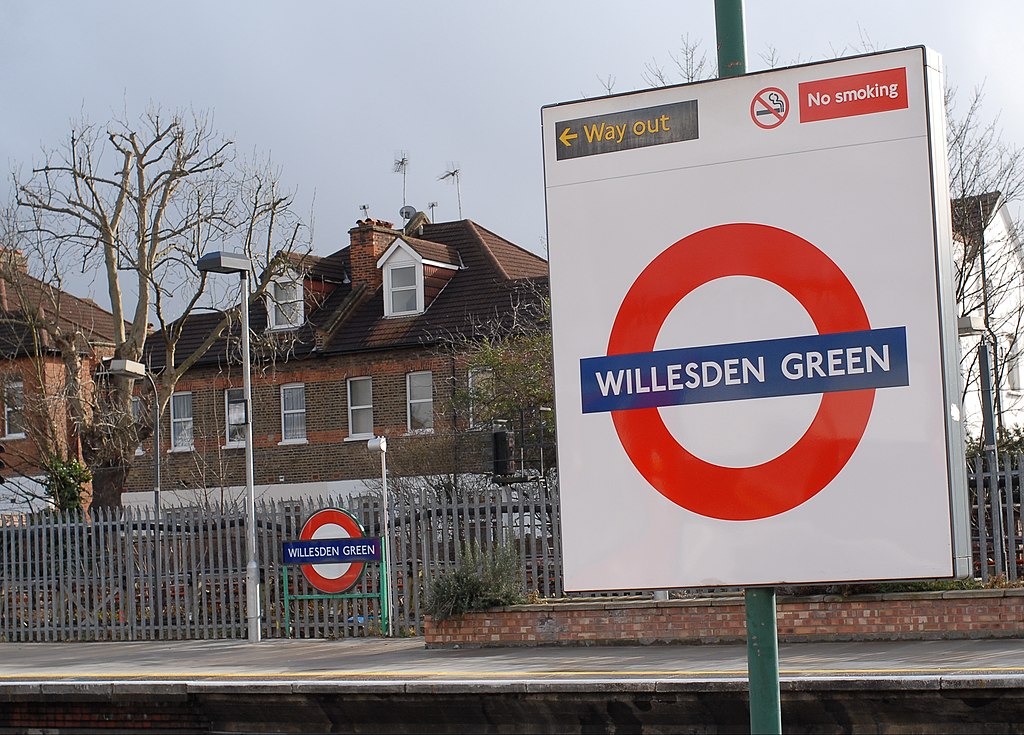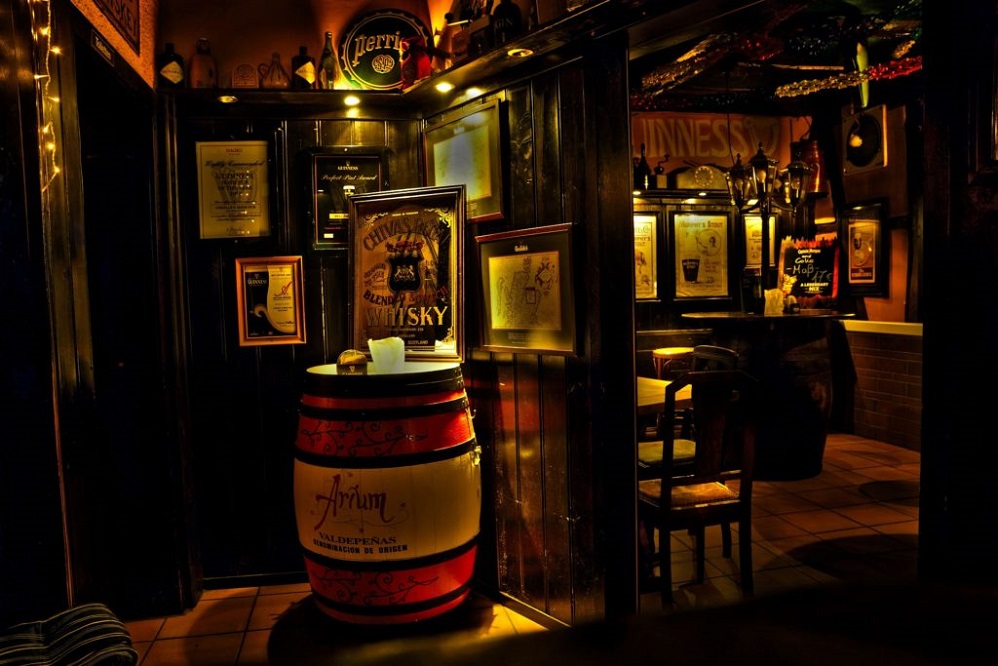Short story: The Boy in the Box Part Two: by Margaret Hannigan Popp

Margaret Hannigan Popp
We got a flat on Willesden Green Road, a garden flat. I couldn’t believe how lucky we were. It was Dafydd who found it. One of the parents, John Thornby, was a partner in Foxtons, the Estate Agents. It was just up the road from the school so it was self interest too.
Dafydd just had a fifteen minute walk along an avenue lined with plane trees, every morning. He was the prif athro, head teacher of Ysgol Gynradd Gymraeg Llundain. Head teacher, only teacher and master of all trades in the one Welsh Language school in London. The parents adored him.
He was completely different to Miss Morris and all the other Misses they had had over the years. Not that they complained about kindly cwtchy rosy Miss Morris but after Year 3 all the pupils had to move to places like Oratory or St Kitts to make sure they could get into the better secondary schools. They all wanted yr iaith Cymreig, but they had to think of the long term, the future, yr dyfodol.
So, when Dafydd Mason came for interview they could see a different future. He had that composure that exuded control without recourse to admonition. The balance of discipline and self-confidence that was needed to stand equal to the sons and daughters of bankers and civil servants. London born and bred. He said West Harrow or Kingsbury, depending on whom he was speaking to. He was very political like that.
Swagger
He had been in the school nearly a year when I looked up from my desk and met his eyes. No saunter or swagger into the bank for him. He queued quietly, I guess you could say anonymously.
‘Shmae, sut ydych chi?’ It was so unexpected. The Welsh greeting exploded in the bank. My cheeks burned. I looked around and everything was the same, burbling on.
Except Violet of course, all big amber eyes and look at you grin. Then a big wink.
‘How do you know that I’m Welsh?’ I hadn’t meant to sound so sharp. I was eighteen and he was twenty three.
‘I just knew,’ he said.
Cheeky? No. He was calm and polite. His Welsh accent was round and fluent. His English accent was precise and even.
‘Cor, he’s posh,’ said Violet, ‘very posh for a teacher.’
‘He’s very public spirited.’ I told her. ‘Devoted to cultural egalitarianism.’ I nearly choked on my cheese sandwich. Violet roared with laughter.
‘Gotta tell Leroy. That’s his problem. He needs to get himself some of that cultural egalitarianism.’ ‘What do his parents do?’ They were dead. Violet stopped laughing. Because it was sad.
His mother was from Aberaeron and his father from Hamburg. They met at the end of the war. He was a research scientist and she went back into teaching after the WAAF. She never went back to Wales. Her family cut her dead.
‘Religion, each to their own.’ They were chapel.
They settled in the new garden estate in Kingsbury because it was so near the Scientific Institute in Mill Hill. She brought Dafydd up Welsh speaking They went on walking holidays to Wales.
He knew everywhere. Yr Wyddfa, the peak of Snowdon. Cader Idris, formidable and forlorn. Penyfan and Corn Du held together with the arrete, lethal in the cross wind. They taught him to never take the mountains for granted.
Looking down on the reservoir lakes at Pontsticill he wondered about the Romans who came trudging up over Penycoedcae. Hard right to get to Penydarren and then on to Gelligaer though the glinting winter snow.
Mari Davies died when he was sixteen. He came in from cricket. They had trashed St Outhes. He scored xx runs. She was in bed.
‘Siarada gyda ei nhad’. She told him to talk with his Dad. ‘Paid a phoeni.’ Not to panic. Three months later she was dead.
Mae llais poeth gyda Miss Prys. Pan mae plentaidd arall yn ysgriffenu, mae hi’n siarad gyda fi. ‘Paid a phoeni, cer â eich amser’. Dwi’n dechrau yn ysgriffenu hefyd. Dwi’n ysgriffenau ac dwi’n gwneud lluniau.
Trauma
‘Yes,’ Miss Prys did have a warm voice. ‘We’ll work together on him. Don’t let him know that you hate the box or think it’s silly or anything like that. At the moment it’s his comfort blanket. He wants to figure things out himself. You walk him to school and get him into the classroom. You would be surprised at how much the other children understand. Yes, they do shout names but they learn that from adults. They know what it is like to feel scared. Most of them have experienced some trauma. Loud voices in the home and then the sound of broken plates. Loud voices in the street. Engines roaring. Burning oil. Shall we give it another week? I’ll keep encouraging him to write and draw his little pictures. He likes that. Little pictures of a mountain. Sometimes with a bird, maybe an eagle? Sometimes a horse. A story he heard?’
But there were no loud voices in our house in White Briar Close, our modern honeyed brick semi-detached, convenient to town centre, train and the Brecon Beacons.
Our happy home.

Saviour neighbours
Gary and Elvis were our neighbours on Willesden Green Road. Our ‘saviour neighbours’, I named them.
The original back garden of the property had been divided in two between the ground floor flats. We got the poorer half, long and narrow. It didn’t matter because Gary put a door in the wall and we could pop in and out to each other all the time.
They were fabulous gardeners. It felt like the Garden of Eden when you went into their side and sat in the swing seat.
A swirling pennant stone path wound down from the patio amongst flower beds massed with lupins, lavandulas, asters, fragrant lillies and around a stone pond before disappearing into another garden behind a trellised wall crowded passionflower and climbing roses.
This hidden arcade revealed itself to you step by step. Large grasses had to be brushed back to reveal lost hyacinths, cottage bells and fragrant honeysuckles.
Here and there, a stone head on a broken limbed body kept guard. Trickling waters from the rills and rivulets drowned out the traffic growls.
Clouds of gold
The bright evening city lights mellowed into falling clouds of gold. I was inspired. I was going to transform our scraggy overgrown plot into something to be proud of. Dafydd and I had settled into a domestic routine and I had plenty of free time.
He had school meetings most nights and even some weekends. Big plans were afoot to redevelop the building as numbers were going up. He was even looking at a potential new site. John Thornby was feeding him information on any options that came up in the borough.
I went to yoga on Thursday nights with Violet but otherwise our main night out was Saturday in the ‘The Holy Ground’ on Wilmot Way in Kilburn.
It was a typical Irish pub but it was the meeting place for us Welshies. There was the usual mix of firebrand politics, talk of independence and homesickness. Hiraeth.
I can’t remember which one of us first decided to go there but anyway we quickly became part of the group. Of course, speaking in Welsh was the rule.
Some of the Irish crowd found it strange to overhear the guttural, the nasal and the sibilant.

Own language
John Joe the barman loved it.
‘Dim Saesneg’, he would shout at the Irish lads at the bar. The plasterers, scaffolders, roofers and chippies jostling for pints and tips in their scrubbed face white shirted best.
‘Dim Saesneg, no English! Do none of you have a focal Gaeilge so we can stand our own language beside them. Fair does to the Welsh. Stick the Wolfe Tones on the juke box so we can have a bit of pride.’
Everyone joined in singing ‘A nation once again’ and we cried out ‘Cymru am byth’ for Wales.
Mum, remember how I wrote little stories for Miss Prys. I would lie in my bed at night and imagine that Mr. Bocs was telling me stories.
I am reading Luke’s schoolbook. Year 6. Llyfr stori. The story book from class with Miss Prys. Every day the children had to write a page for her. Something about what they did after school maybe a game of football on the rec or running to the shop for bread.
It was a diary style to encourage the children to write without worrying about what they should say. Just to laugh at simple little things like, ‘I saw Eifion Williams bringing a bucket of mash to the piglets.he didn’t see me because I was hiding in the hedge’
Laughing comes so easily to children. It makes it so much harder for them when they are left. Alone.
‘Weithiau, dwi’n siarad gyda Mr Bocs. Weithiau, Mr Bocs yn siarad gyda fi. Rhoiodd Dad ei llaw e ar fy phen i. Dwi’n teimlio e er hynny. Ei llaw. Fy phen. ‘Mr. Bocs, pwy wyt ti?’
Onto something
Dafydd and I were sitting at our little table eating lasagne. He had spent the afternoon making it while I was out learning how to ‘pot up’ from Gary. We had sweetpeas all set to go.
‘I think I’m being followed’, Dafydd said.
‘Followed? What do you mean?’
I felt a knot in my stomach.
‘I just know. I’ve seen the same bloke across the street, on the high street, at the Tube station.’
‘Who is he?’
‘No idea cariad but I’m sure of it. There’s a lot of talk about South Africans keeping tabs on people these days. Checking on the Irish mainly to find their contacts. Derry was saying its all about networks and lines of communication. As far as their concerned we are all the same. Irish, Welsh. They don’t really know the difference. They spot the regulars in Kilburn, see who’s meeting who. Put two and two together. Think they’re onto something.’
My stomach hurt.
‘I’m pregnant,’ I said.
Dywedais i ‘Nos dda’ i Dad. Dywedais Dad ‘Nos dda’ i fi. Rhoiodd Dad ei llaw e ar fy phen. Es i i’r gwely. Yn y bore nesaf, gallais i ddim yn chwilio fy nhad. Fe ffeindias Mr Bocs mewn garej.
Luke was born in Hillingdon Hospital on March 12th 1992. Dafydd was brilliant. He held my hand and stroked my head for four hours.
Fy phen. My head. Ei law. His hand.
Actually, he was brilliant from the start. Didn’t blink or hesitate. Just got up and gathered me in his arms and kissed me.
‘Cariad shush don’t worry. Everything will be fine. Safe. I’ll always take care of you. And our baby.’
Dweud, to say. Rhoi, to put. Chwilio, to search.
I wrote and told my mother when I was six months pregnant. I didn’t have the bottle to ring her. How could I explain London to her?
Eddie rang. ‘You broke your mother’s heart. She’ll get over it. Is he good to you? If he ever…we’ll be up.’
Angels
When I came home from the hospital, there was a box. Three crocheted cardigans, a little bonnet with blue embroidered flowers and a handknitted baby blanket. A red teddy bear was appliqued on the blanket. I recognised the felt from my old school kilt.
Gary said, ‘Oh my, I could cry.’
Elvis said, ‘Lucky you, Linda.’
And I was so lucky. They were angels. They loved to baby sit and help out. I never felt lonely. I went back to work when Luke was nine months old. After Christmas. A New Year.
Violet knew a childminder and Dafydd picked him up after school.
It was the end of March, before the clocks went back when I first noticed him. It was his shoes. I thought that’s odd. I’ve seen the same pair of shoes three nights in a row. As you walk down the steps into Willesden tube station you are at eye level with the pavement.
They were ordinary black Winstanley shoes but the laces stood out. Twisted red and green laces, like in climbing shoes. He was average sized, in his thirties, just dark jeans and jumper with a duffle coat. A tufty moustache, that’s all.
Lead in my stomach
Then, I saw him outside the tobacconist as I walked up Kerslake Road. I felt a bit sick. I held my breath. I looked back when I got to the corner. He was still standing there. Looking up the road at me.
The next evening, I looked everywhere before I got on the Tube. As usual, it was packed.
Halfway up Kerslake Road, I saw him again. On the other side of the road. There’s no bus stop there. He was just standing outside the red bricked house with the white iron gates. He was shaded by the plane trees.
I felt a balloon of lead in my stomach. It was getting bigger and heavier. I tried to run but my legs felt like swollen jelly.
‘Dwi’n teimlo e er hynny’.
I feel it still. Fear, real fear like that, it never goes away. Same as love like that. Maybe it was a blessing in a way. The bank were delighted that I would move to Merthyr Tydfil.
I was promoted to Assistant Manager in charge of foreign currency and client liaison. Cash transactions were still the main business in South Wales then. Some people said it was a sign of the black economy, cash doesn’t give away secrets.
Liaison
Anyway, Merthyr Tydfil had a lot of customers with cash. And they were starting to go on holidays. Correction – they always loved going on holidays but now they could go on holidays to the sun. Lots of them.
The manager was Mr Philip Maynard. Not someone you would expect to be a feminist.
‘Linda,’ he said ‘the staff here are very loyal but I have to be realistic about limitations. You are our expert now in the new technology and transfer processes. I won’t pretend that I can login, switch screens or call up the live rates but I understand the underlying principles. You will have my full support to train up the staff and advise me on new recruits. We need to get one or two new people in to work the computers. I also want you to take on the liaison with the London desk. You have the accent for it.’
In return, he arranged a good mortgage for me. In my own name.
Dafydd said, ‘We should put the house in your name because it’s your job that got it for us. I’m an enlightened bloke!’
Mam said, ‘Well, that’s probably for the best.’ She knew a lot about some things.
My father had died intestate and it took a long time to sort out the house and insurance. Working in a bank you get to hear how difficult life can become when the unexpected happens.
We bought this house in White Briar Close. On a new development, with lots of potential to extend.
He wanted to take a break from teaching, be a house husband, have the time to be with Luke. An evening job in the Rose and Crown gave him the chance to settle in, get to know people as well as contribute to our finances.
I never wanted to hurt you Mum. To destroy you with questions. To make you cry again. I just thought you would tell me. Explain things. Eventually. Then it became harder to ask. I couldn’t work out what words to use. I started to forget him. I just remembered things. Maybe it was my fault. People just don’t disappear.
Emergency
Violet rang me two weeks after Dafydd left.
‘I have to go into hospital. I’ve been telling them for months that it can’t be periods. Now I’m an emergency. Don’t go all chapel on me now sweetie. I don’t need prayers. Leroy is in bits. Could you come up for a few days?’
People say ‘white as a sheet’. Well Violet couldn’t turn white. She lay on the white sheet, fading. I could see her light fading. No hair. No eyebrows. Her lips were very brown. Soft and brown. I kissed her. I told her that she was beautiful.
‘I told Leroy, take care of me now. When I’m gone, get yourself together and find another girl. I don’t want to be sitting up in heaven watching him being all lonely and miserable. I made him promise me. Promise me, I said to him, or I’ll come back and haunt you.’
That was Violet, fierce, no matter what. She said I should promise her too, that I would get someone else. I told her that I was Ok, I had Luke. I had plans. I just wanted to stay with her for as long as I could. She was my friend. My best friend.
We buried her in Haringey Cemetery as we sang ‘Nearer my God to thee.’ Her brother wore a crisp white shirt.
He took the spade from the gravediggers.
He swung it easy, as if it was a wand.
The final part of The Boy in the Box will be published tomorrow. Read the first instalment here
Support our Nation today
For the price of a cup of coffee a month you can help us create an independent, not-for-profit, national news service for the people of Wales, by the people of Wales.





